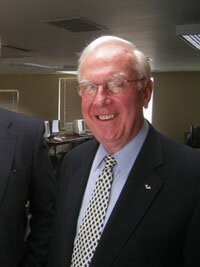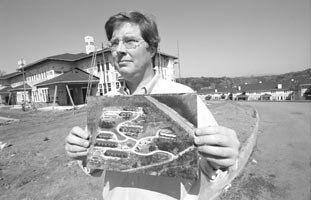NEWS- Car talk: Sale rumors, dispute enliven meeting

Berry: "We don't like folks who put spin on CPC."
FILE PHOTO BY HAWES SPENCER

Spurzem: "The best time to have sold the company was two years ago."
FILE PHOTO BY JEN FARIELLO
Downtown's biggest parking company reports that fewer downtown concerts, along with a couple of business shuffles, conspired to reduce cars in its lots by 18 percent in 2007, according to a fireworks-packed annual meeting on March 27 that included the confiscation of a reporter's notes by a company lawyer.
"2007 was another good year for CPC as we continued our purpose of providing low-cost parking for downtown shoppers," said Charlottesville Parking Center chair Jim Berry at the meeting in an office on Westfield Road. He reported that a late 2006 boost in parking prices coupled with a ban on validated parking in the company's surface lot helped the company gross more than a $100,000 in additional revenue despite a drop to 587,000 hourly parkers, down from 717,000 in 2006.
As Berry explained to at least 25 stockholders and company officials, 2007's annual profit of $370,000 was second only to the prior year's record profit of $573,000 (which included some one-time revenues).
General manager Bob Stroh pointed to the two-block move of Atlantic Coast Athletic Club, the closure of the Hardware Store restaurant, and fewer concerts put on by both the Charlottesville Pavilion and the Paramount Theater to account for about 69,000 of the fewer hourly parkers.
But Stroh and Berry said that signs are looking up, including more concerts this year, plus a recent deal to provide at least 70 monthly spaces to the under-construction Landmark Hotel.
"We're benefiting from the split between day and night parking demand," said Berry. "In effect, we're able to lease our parking space twice– during the day to employee monthly parkers and downtown shoppers and in the evening to patrons of restaurants and entertainment venues."
Berry has come under fire over the years from some former and would-be CPC shareholders concerned about how closely he guards the shareholder lists. Despite Berry's protest that CPC has been unfairly maligned as secretive, attorney Bob Hodous provided a vibrant demonstration.
At the meeting, Hodous snatched away from a Hook reporter a list of company shareholders that had been offered just a moment earlier.
"That is not a proper purpose," said Hodous as he walked off not only with the list but also with the reporter's half-page of hand-written notes. The reporter later asked Berry whether he endorsed Hodous's action.
"Absolutely," Berry responded. "We don't put spin on any information we give to shareholders, and we don't like folks who put spin on CPC."
Hodous stood up and offered to let the Hook jot down shareholder names if, he said, "you want to sign a confidentiality agreement." (We didn't.)
Berry and the late Hovey Dabney, who both accumulated tens of thousands of shares (often for around a dollar each), eventually purchased about a third of a company that was set up in 1959 by struggling merchants trying to fund cheap parking.
Berry went on to talk about teamwork and rallying for a cause– particularly noting how World War II's need for tanks, ships, and airplanes presented what initially seemed like an insurmountable challenge.
"I don't know whether those of us today who are ridiculing those people, whether they just don't have an appreciation for the time," said Berry. "And I think the downtown owes a debt of gratitude to those who made the sacrifices and put up the money and saved downtown."
Even though Berry was not among the original 1959 shareholders, his impassioned speech won kudos and some applause from current shareholders at the meeting. He went on to explain how he wound up with so many shares.
A 1998 appraisal by Triumph Associates set the company's value at just $2.61 per share, and Berry revealed that one of his share-buying missions followed a meeting at which City Manager Gary O'Connell and Economic Development Director Aubrey Watts declined a plea for the City to buy shares.
Company records leaked to the Hook show that in 1996 and 1997, in a total of ten transactions, Berry and Dabney each bought 61,929 shares for just one dollar each.
"It was a different financial situation downtown," explains Berry. "It bothers me today that people are putting spin on it that we've stolen something. I think it may be more appropriate to give us a pat on the back for what we've accomplished over the years."
After another lawyer told attendees that recent appraisals value company assets around $30 million, Berry suggested that shares are now worth about $60 a share, "and that's conservative."
According to the trusty calculator, $30 million divided by each of the company's 405,043 shares might make each one worth $70. As for Berry himself, who now appears to own just 61,432 shares, if memory serves (since the notes were snatched away), he may now hold $4.3 million in company stock.
One shareholder remembers how a Charlottesville business group called the Retail Merchants Association found itself sitting on an unexpected sum of around $2 million, and in 1995 donated it to the Charlottesville Area Community Foundation. The CPC, by contrast, performed its benevolence by offering below-market parking, volunteering its staff for community events, and never paying anything to the owners. Until 2008.
Attendees smiled at mention of the company's big news from January: a first-ever dividend of 50 cents per share.
One of the hot issues is whether the CPC will sell itself to the City of Charlottesville, and indeed Berry confirmed that the group's self-imposed April 1 bid deadline was timed for the benefit of the City.
"Well, that's not something that we will make," said City economic development director Watts in a telephone interview after the meeting. "We're in the process of preparing some evaluations, but we'd have to talk to Council before negotiating anything."
In recent months, the City has commissioned a $200,000 consultation from the Williams Mullen law firm to ascertain whether it should buy CPC. As for last year's City-funded $153,000 design contest for two downtown asphalt blocks including the CPC parking lot, Watts notes: "I see that as a totally and completely separate thing."
"The task of finding a buyer for our company may very well be a long-term process," Berry told the annual meeting and warned that taxes might leave owners with just 48 cents on the dollar of any sale price.
"I anticipate that your board of directors," said Berry, "will continue to pay dividends as long as surplus cash accumulates."
"It's been a long time," said 85-year-old shareholder Bill Moore, breaking into his own impromptu applause.
***
As this issue was going to press on April 1, the Hook learned that CPC shareholder Richard Spurzem tendered a tax-reduced stock buy-out offer that afternoon of $9.3 million, or $23 per share, and called for a shareholder vote within 30 days.
#